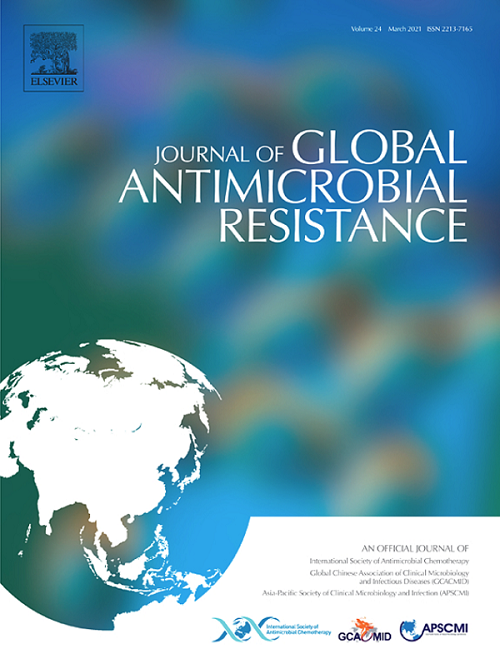长期输注β-内酰胺类抗生素可降低危重患者的短期死亡率:随机对照试验的荟萃分析和试验序列分析。
IF 3.2
3区 医学
Q2 INFECTIOUS DISEASES
引用次数: 0
摘要
目的:探讨长期输注β-内酰胺类抗生素治疗危重患者的临床疗效,为临床提供补充证据。材料和方法:本荟萃分析在PROSPERO数据库(CRD42024614894)中前瞻性注册。我们检索了PubMed、Web of Science、Scopus和Clinical trials .gov,以确定符合条件的随机对照试验(RCTs)进行荟萃分析和试验序列分析(TSA),比较成人危重患者长期输注β-内酰胺类抗生素与间歇性输注β-内酰胺类抗生素的死亡率。评估、发展和评价方法(GRADE)用于评估所有结果证据的确定性。结果:24项随机对照试验共纳入9558例成人危重患者。与间歇性输注β-内酰胺类抗生素相比,综合结果显示,长期输注与较低的短期死亡率相关(OR, 0.87;0.79 - 0.95;高确定性),但90天死亡率统计上没有(OR, 0.91;0.83 - 1.01;中等确定性),这得到了TSA的支持。回归分析未发现影响短期死亡率的显著因素。对于其他结果,延长输注时间可显著提高临床治愈率(OR, 1.31;1.20 - 1.42;低确定性)和微生物根除(OR, 2.29;1.61 - 3.25;结论:尽管在90天死亡率方面没有统计学上的益处,但长期输注β-内酰胺类抗生素在短期死亡率、临床治愈率和微生物根除方面有显著的益处。TSA支持重症患者长期输注的短期生存益处。本文章由计算机程序翻译,如有差异,请以英文原文为准。
Prolonged infusion of β-lactam antibiotics decreases short-term mortality in critically ill patients: A meta-analysis and trial sequential analysis from randomized control trials
Objectives
The aim of this study was to ascertain the clinical efficacy of prolonged infusion of β-lactam antibiotics in critically ill patients and to provide additional evidence.
Methods
This meta-analysis was prospectively registered on the PROSPERO database (CRD42024614894). We searched PubMed, Web of Science, Scopus, and Clinical Trials.gov to identify eligible randomized control trials (RCTs) for conducting a meta-analysis and trial sequential analysis (TSA) comparing mortality between prolonged vs. intermittent infusion of β-lactam antibiotics in adult critically ill patients. The Grading of Recommendations Assessment, Development, and Evaluation approach (GRADE) was used to evaluate the certainty of evidence for all outcomes.
Results
Twenty-four RCTs involving 9558 adult critically ill patients were finally included in this meta-analysis. Compared with intermittent infusion of β-lactam antibiotics, the pooled results demonstrated that prolonged infusion was associated with lower short-term mortality (OR = 0.87, 95% confidence interval [CI] = 0.79–0.95; high certainty), but not 90-d mortality statistically (OR = 0.91, 95% CI = 0.83–1.01; moderate certainty), which was supported by TSA. Regression analysis found no significant factors affecting short-term mortality. For other outcomes, prolonged infusion could significantly improve clinical cure (OR = 1.31, 95% CI = 1.20–1.42; low certainty) and microbiological eradication (OR = 2.29, 95% CI = 1.61–3.25; moderate certainty).
Conclusions
Despite no benefit in 90-d mortality statistically, prolonged infusion of β-lactam antibiotics was associated with significant benefits in short-term mortality, clinical cure, and microbiological eradication. TSA supported the short-term survival benefit of prolonged infusion in critically ill patients.
求助全文
通过发布文献求助,成功后即可免费获取论文全文。
去求助
来源期刊

Journal of global antimicrobial resistance
INFECTIOUS DISEASES-PHARMACOLOGY & PHARMACY
CiteScore
8.70
自引率
2.20%
发文量
285
审稿时长
34 weeks
期刊介绍:
The Journal of Global Antimicrobial Resistance (JGAR) is a quarterly online journal run by an international Editorial Board that focuses on the global spread of antibiotic-resistant microbes.
JGAR is a dedicated journal for all professionals working in research, health care, the environment and animal infection control, aiming to track the resistance threat worldwide and provides a single voice devoted to antimicrobial resistance (AMR).
Featuring peer-reviewed and up to date research articles, reviews, short notes and hot topics JGAR covers the key topics related to antibacterial, antiviral, antifungal and antiparasitic resistance.
 求助内容:
求助内容: 应助结果提醒方式:
应助结果提醒方式:


